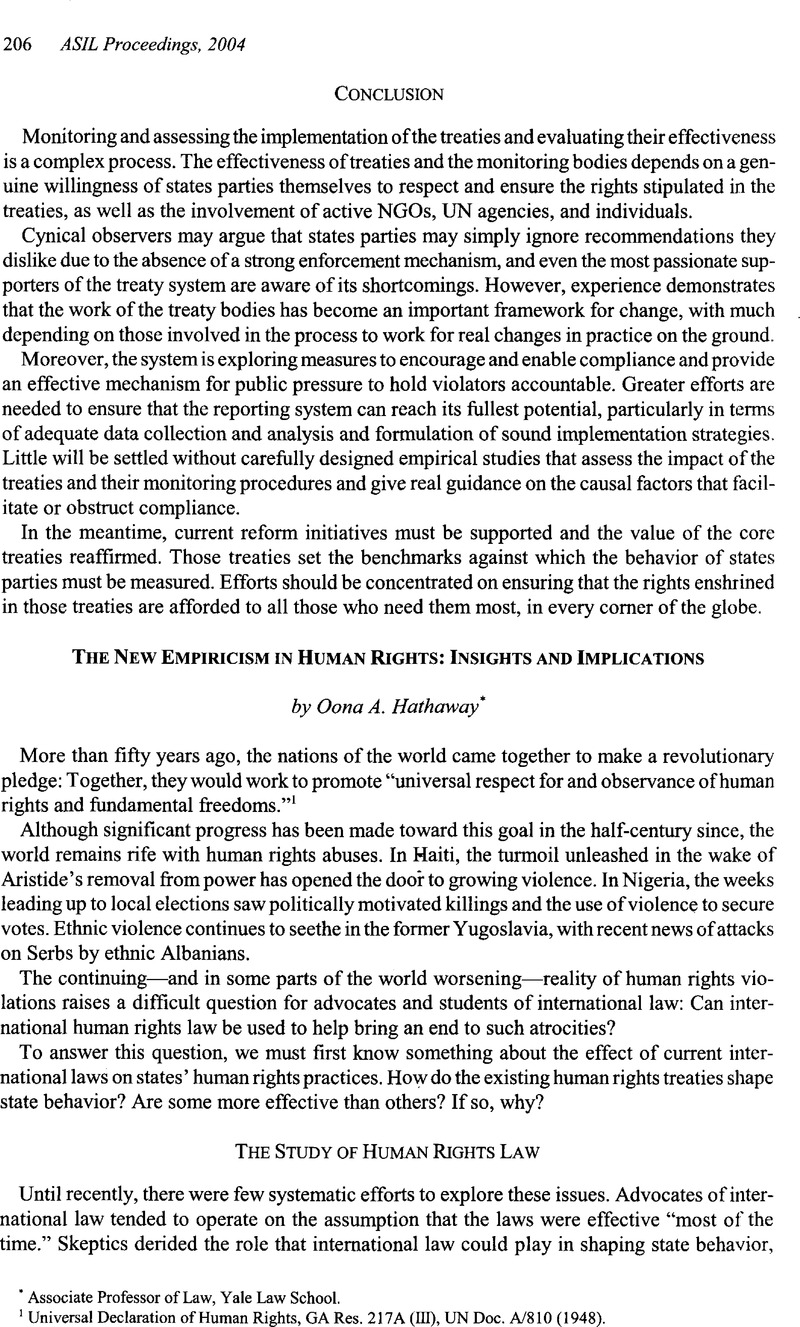Article contents
The New Empiricism in Human Rights: Insights and Implications
Published online by Cambridge University Press: 28 February 2017
Abstract

- Type
- Empirical Work in Human Rights
- Information
- Copyright
- Copyright © American Society of International Law 2004
References
1 Universal Declaration of Human Rights, GA Res. 217A (Ш), UN Doc. A/810 (1948).
2 Helfer, Laurence R., Overlegalizing Human Rights: International Relations Theory and the Commonwealth Caribbean Backlash Against Human Rights Regimes, 102 Colum. L. Rev. 1832 (2002)CrossRefGoogle Scholar.
3 Lutz, Ellen L. & Sikkink, Kathryn, International Human Rights Law and Practice in Latin America, 54 Int’l Org. 633 (2000)CrossRefGoogle Scholar.
4 Hathaway, Oona A., Do Human Rights Treaties Make a Difference?, 111 Yale L. J. 1935, 1935-2042 (2002)CrossRefGoogle Scholar; Hathaway, Oona A., The Cost of Commitment, 55 Stan. L. Rev. 1821 (2003)Google Scholar; Oona A. Hathaway, Why Do Nations Join Human Rights Treaties? (unpublished manuscript, on file with author); Keith, Linda Camp, The United Nations International Covenant on Civil and Political Rights: Does it Make a Difference in Human Rights Behavior?, 36 J. Peace Res. 95 (1999)CrossRefGoogle Scholar; and Beth Simmons, Why Commit? (unpublished manuscript, on file with author).
5 Hathaway, Do Human Rights Treaties Make a Difference?, supra note 4.
6 For a debate over the pros and cons of quantitative empirical research, see Hathaway, Oona A., Testing Conventional Wisdom, 13 Eur. J. Int’l L. 185 (2003)CrossRefGoogle Scholar; Goodman, Ryan & Jinks, Derek, Measuring the Effects of Human Rights Treaties, 13 Eur. J. Int’l L. 171 (2003)CrossRefGoogle Scholar.
7 The following is adapted from a lengthier discussion in Hathaway, Oona A., Between Power and Principle: A Political Theory of International Law, 71 U. Chi. L. Rev. (forthcoming May 2005)Google Scholar.
8 Moravcsik, Andrew, The Origins of Human Rights Regimes: Democratic Delegation in Postwar Europe, 54 Int’l Org. 217, 220 (2000)CrossRefGoogle Scholar.
9 These findings are discussed in more depth in Hathaway, Do Human Rights Treaties Make a Difference?, supra note 4; Hathaway, The Cost of Commitment, supra note 4; and Hathaway, Why Do Nations Join Human Rights Treaties?, supra note 4.
10 These findings are drawn from Hathaway, The Cost of Commitment, supra note 4; Hathaway, Why Do Nations Commit to Human Rights Treaties?, supra note 4; Hathaway, Why Do Nations Join Human Rights Treaties?, supra note 4.
11 See Keith, supra note 4 (finding that becoming a party to the International Covenant on Civil and Political Rights does not appear to make a difference in human rights behavior); Hathaway, Do Human Rights Treaties Make a Difference?, supra note 4; and Hathaway, Why Do Nations Join Human Rights Treaties?, supra note 4.
12 For example, Amnesty International and Human Rights Watch both produce excellent reports on countries’ human rights practices. Yet these reports are relatively short and do not cover every country every year, making them a poor source for social scientific inquiry. The Freedom House produces one of the very few quantitative human rights indexes, but it has been criticized for lack of replicability and reliability. See Freedom House, Freedom in the World: The Annual Survey of Political Rights and Civil Liberties 1999-2000 (Karatnycky, Adrian ed., 2000)Google Scholar; Mitchell, Christopher et al., State Terrorism: Issues of Concept and Measurement, in Government Violence & Repression 1, 20 (Stohl, Michael & Lopez, George A., eds., 1986)Google Scholar (critiquing the Freedom House reports). The U. S. Government also does a set of human rights reports but they have been charged with political bias. E.g., Carleton, David & Stohl, Michael, The Role of Human Rights in U.S. Foreign Assistance Policy: A Critique and Reappraisal, 31 Am. J. Pol. Sci. 1002, 1007 (1987)CrossRefGoogle Scholar (citing and briefly discussing reports of Americas Watch, Helsinki Watch, and the Lawyers Committee for International Human Rights and critiquing the State Department reports for political bias).
- 15
- Cited by




